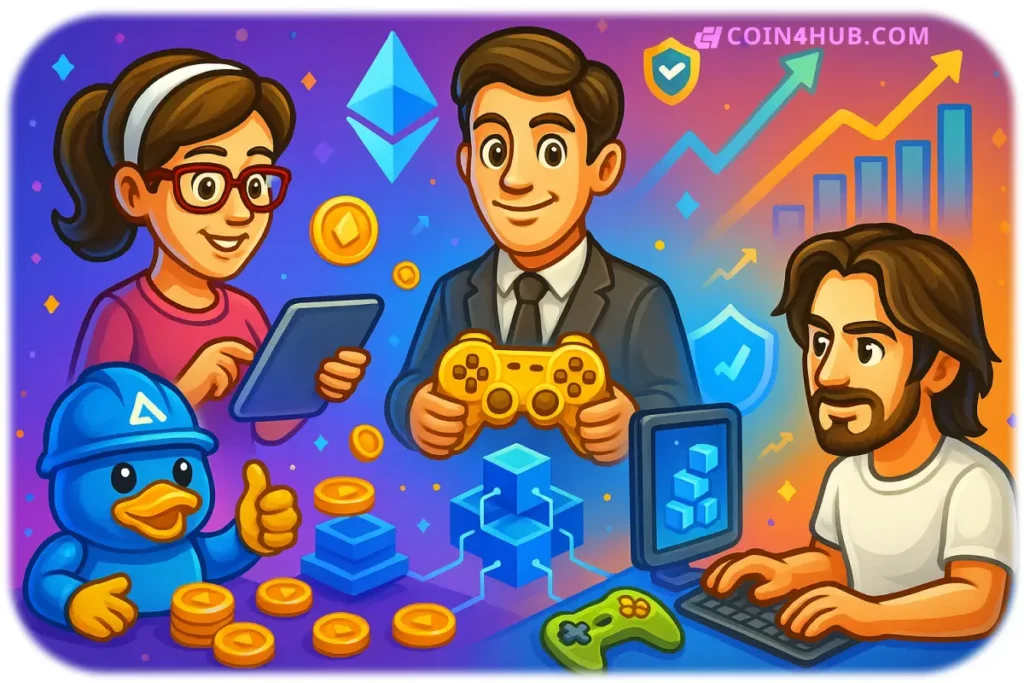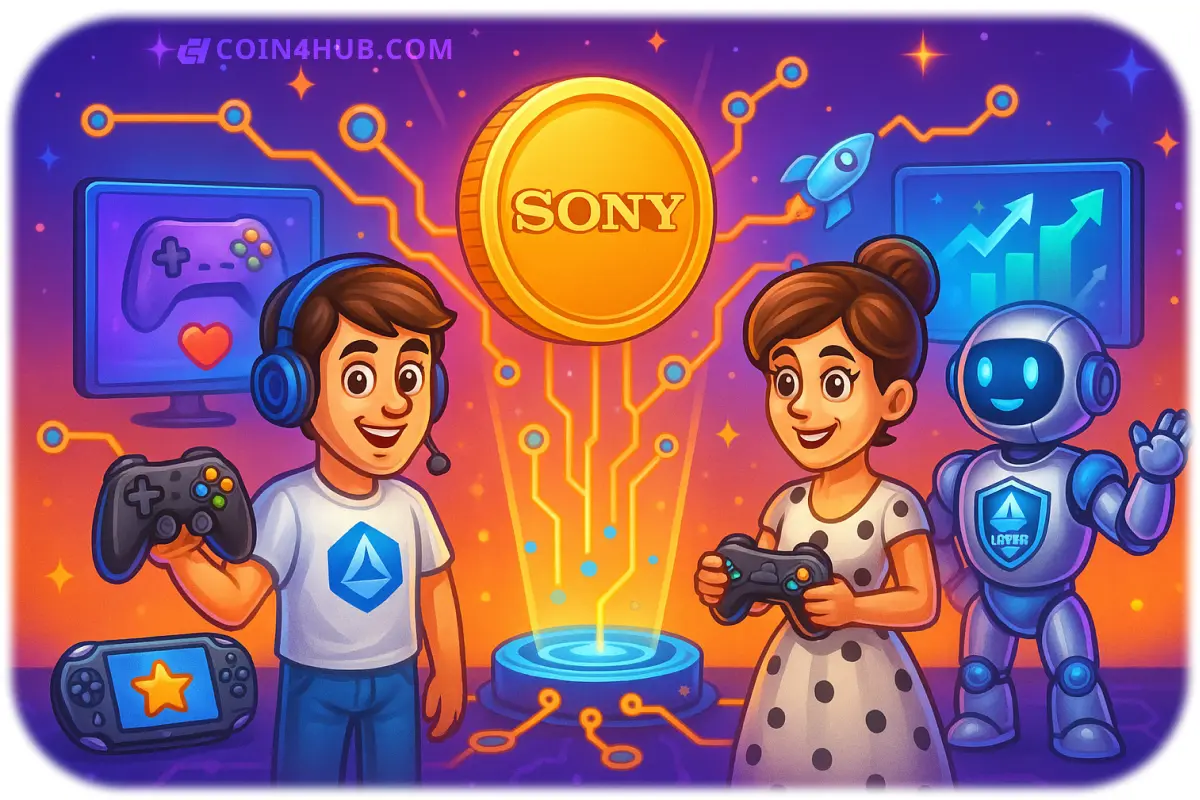Table of Contents
In a significant move that further blurs the lines between traditional tech giants and blockchain innovation, Sony’s Ethereum-based Layer-2 solution, Soneium, has launched a comprehensive gaming incubator program. The initiative, named “Soneium For All,” aims to accelerate consumer and gaming applications within Sony’s growing blockchain ecosystem that already boasts 7 million users.
This development represents a major step in Sony’s blockchain strategy and highlights the increasing adoption of Web3 technologies by established consumer electronics companies. Let’s dive deeper into what this means for developers, gamers, and the broader cryptocurrency ecosystem.
Sony’s Strategic Expansion into Blockchain Gaming
The 78-year-old Japanese electronics powerhouse has been quietly building its blockchain infrastructure through Sony Block Solutions Labs (SBSL), the team behind Soneium. By leveraging the Optimism OP stack—a scaling solution that provides faster and cheaper transactions on Ethereum—Sony is positioning itself at the intersection of traditional gaming and emerging blockchain technology.
This incubator program isn’t just another corporate venture into blockchain; it represents a calculated approach to bridge traditional gaming audiences with Web3 innovations. With Sony’s established presence in the gaming industry through PlayStation and various game studios, this move could potentially bring blockchain gaming to millions of mainstream users who might otherwise never engage with cryptocurrency applications.
Key Features of the Soneium For All Incubator
The new accelerator program, scheduled to launch in the third quarter of 2025, brings together several important elements that make it stand out in the increasingly crowded blockchain incubator space:
- Strategic Partnerships: Developed in collaboration with Astar Network and Startale Cloud Services
- Financial Backing: Investment support provided by Sony Innovation Fund
- Target Audience: Focused on creators, developers, and gaming communities
- Technical Foundation: Built on Optimism’s OP Stack for faster, cheaper transactions
- User Base: Immediate access to Soneium’s 7 million user ecosystem
These components create a robust framework for developers looking to build consumer-focused and gaming applications on blockchain technology without the typical barriers to entry.
How Soneium’s Layer-2 Technology Works
Understanding Soneium’s technical foundation helps explain why Sony chose this particular approach for its blockchain strategy. As an Ethereum overlay blockchain (Layer-2 solution), Soneium offers several advantages over building directly on Ethereum’s main network:
| Feature | Ethereum Mainnet | Soneium (Layer-2) |
|---|---|---|
| Transaction Speed | 10-15 transactions per second | Up to thousands per second |
| Gas Fees | Often high during network congestion | Significantly lower, more predictable |
| Security Model | Direct consensus participation | Inherits Ethereum’s security with additional optimizations |
| User Experience | Can be complex for newcomers | Designed for mainstream adoption with simplified interfaces |
| Development Environment | Mature but costly for testing | Optimized for game development with lower costs |
By using the Optimism OP stack, Soneium leverages optimistic rollups, a scaling technology that processes transactions off the main Ethereum chain while still maintaining security guarantees. This makes it particularly suitable for gaming applications that require high-frequency interactions and microtransactions without prohibitive costs.
The Bridge Between Web2 and Web3
One of the most significant aspects of the Soneium initiative is its explicit goal of “bridging the gap between Web2 and Web3 audiences.” This philosophy addresses one of the biggest challenges in blockchain adoption: the technical complexity that often deters mainstream users.
Sony Block Solutions Labs highlighted this mission in their announcement, emphasizing their focus on creators, fans, and community. This approach acknowledges that for blockchain gaming to achieve mass adoption, it must first solve the onboarding problem that has plagued many Web3 projects.
By leveraging Sony’s existing brand recognition and user trust, Soneium potentially offers a smoother transition for traditional gamers into blockchain-based gaming ecosystems. This strategy could prove crucial for several reasons:
- Users already familiar with Sony’s gaming products may be more willing to experiment with blockchain features when presented within a trusted environment
- Developers gain access to established distribution channels and marketing support
- The technical complexities of blockchain interaction can be abstracted away behind user-friendly interfaces designed by a company with decades of consumer electronics experience

The Vision Behind Soneium For All
Ryohei Suzuki, Director of Sony Block Solutions Labs, provided insight into the broader vision behind the initiative: “This initiative reflects our vision to empower creators globally through blockchain technology. By lowering the barriers to entry for developers and helping them reach users faster, Soneium For All brings us closer to a more open, creator-powered internet.”
This statement reveals that Sony sees blockchain not just as a technological tool but as a means of reshaping the relationship between creators, platforms, and users. The emphasis on empowerment and openness suggests that Sony recognizes some of the limitations in traditional gaming ecosystems:
- Revenue models that heavily favor platforms over creators
- Limited ownership of digital assets by players
- Centralized control of game economies
- Fragmented multiplayer experiences across different platforms
By embracing blockchain technology, Sony appears to be positioning itself for a future where these limitations might be addressed through decentralized technologies while still maintaining its role as a central platform provider.
Potential Impact on the Gaming Industry
Sony’s entry into blockchain gaming through this incubator program could have far-reaching implications for how the broader gaming industry approaches blockchain technology. With PlayStation being one of the dominant console platforms globally, Sony’s exploration of blockchain gaming legitimizes the technology for many traditional game developers who may have been hesitant to explore this space.
The potential impacts include:
Accelerated Mainstream Adoption
Sony’s established distribution channels and marketing power could significantly accelerate the adoption of blockchain games beyond the current crypto-native audience. This might lead to simplified onboarding experiences that make Web3 gaming accessible to millions of traditional gamers.
New Economic Models
With Sony’s experience in digital marketplaces through the PlayStation Store, the company is well-positioned to experiment with new economic models that blend traditional gaming purchases with blockchain-based ownership and trading. This could potentially create new revenue streams for both Sony and developers in its ecosystem.
Industry Standards
As a major player in the gaming industry, any blockchain standards or practices that Sony adopts could potentially become industry standards. This includes approaches to NFT integration, token economics, and interoperability between games.
Competition from Other Gaming Giants
Sony’s move may accelerate similar initiatives from other gaming platforms like Microsoft (Xbox), Nintendo, and major game publishers who won’t want to be left behind in the blockchain gaming race. This competitive pressure could drive rapid innovation in the space.
Partnerships Powering the Incubator
The collaboration with Astar Network and Startale Cloud Services adds significant technical capabilities to the Soneium incubator program. Astar Network, a multichain smart contract platform, brings expertise in interoperability and cross-chain development that could be crucial for games that need to interact with multiple blockchain ecosystems.
Startale Cloud Services provides infrastructure support that will be essential for scaling blockchain games to mainstream audiences. These technical partnerships, combined with financial backing from Sony Innovation Fund, create a comprehensive support system for developers entering the program.
The structure of these partnerships suggests that Sony is taking a platform approach rather than focusing on developing its own blockchain games in-house. This strategy allows Sony to position itself as an enabler and beneficiary of a broader ecosystem of blockchain games rather than competing directly with third-party developers.
The Broader Trend: Traditional Tech Embracing Blockchain
Sony’s blockchain initiative is part of a larger trend of established technology companies exploring blockchain technology for future operations. As the original article notes, “the Apple’s and Ubers of this world” are looking toward blockchain to commercialize future operations.
This shift represents a significant evolution in how blockchain technology is perceived by traditional corporations. Rather than viewing cryptocurrencies and blockchain as disruptive threats, these companies are increasingly seeing them as tools for innovation within their existing business models.
For Sony specifically, blockchain technology offers potential solutions to several challenges in its gaming business:
- Digital rights management that balances publisher control with true user ownership
- New monetization opportunities beyond initial game sales and in-app purchases
- Enhanced security for player accounts and digital assets
- Cross-platform identity and asset portability
- Community governance mechanisms for long-running game properties
By establishing Soneium and launching this incubator program, Sony is positioning itself to explore these possibilities while maintaining control over the user experience—a crucial consideration for a company with Sony’s brand value.
Challenges and Considerations
Despite the promising aspects of Sony’s blockchain gaming initiative, several challenges and considerations will need to be addressed for the program to succeed:
Regulatory Uncertainty
The regulatory landscape for blockchain gaming remains uncertain in many jurisdictions. As a global company, Sony will need to navigate complex and sometimes contradictory regulations around tokenization, NFTs, and play-to-earn mechanics.
User Education
Even with simplified interfaces, blockchain concepts like wallets, private keys, and token economics require some user education. Sony will need to develop effective onboarding strategies that don’t overwhelm mainstream gamers.
Balancing Decentralization with Control
One of the core philosophical tensions in corporate blockchain initiatives is finding the right balance between true decentralization (which gives users and developers more power) and maintaining platform control (which protects Sony’s business interests). This balance will be crucial to the long-term success of Soneium.
Integration with Existing Systems
How Soneium will interact with Sony’s existing digital ecosystem, particularly PlayStation Network, remains to be seen. Seamless integration could be a major advantage, but technical and business challenges might complicate this process.
What This Means for Developers
For game developers and blockchain creators, the Soneium For All incubator represents a significant opportunity to gain access to Sony’s extensive user base and technical infrastructure. The program could be particularly valuable for:
- Indie Game Studios: Smaller development teams that want to explore blockchain integration without building all the infrastructure themselves
- Blockchain Developers: Teams with blockchain experience looking for paths to mainstream gaming audiences
- Content Creators: Artists, streamers, and other creators interested in blockchain-based fan engagement
- Traditional Game Developers: Established studios curious about blockchain but hesitant to make the jump without support
The timing of the program’s launch in Q3 2025 gives developers some runway to prepare concepts and early prototypes. Those interested in participating would be wise to start familiarizing themselves with the Optimism OP stack and the specific requirements of the Soneium ecosystem.
Looking Forward: The Future of Sony’s Blockchain Strategy
The launch of the Soneium For All incubator provides some clues about Sony’s longer-term blockchain strategy. Rather than treating blockchain as a separate experimental division, the company appears to be integrating it into its broader digital strategy.
Future developments might include:
- Integration between Soneium and PlayStation Network for cross-platform digital asset ownership
- Blockchain-based loyalty programs that reward long-term Sony customers across different product lines
- NFT marketplaces for PlayStation game assets, possibly extending to Sony’s music and film properties
- Decentralized identity solutions that work across Sony’s diverse product ecosystem
- Tokenized governance for PlayStation communities and game-specific ecosystems
The success of the incubator program will likely influence how aggressively Sony pursues these potential directions. If the initial projects demonstrate strong user adoption and business value, we could see accelerated investment in blockchain technology across Sony’s divisions.
Key Takeaways
Sony’s launch of the Soneium For All incubator represents a significant milestone in the convergence of traditional gaming and blockchain technology. Here are the key points to remember:
- Sony is leveraging Ethereum Layer-2 technology through the Optimism OP stack to create a faster, cheaper blockchain environment suitable for gaming applications
- The incubator program will provide technical, financial, and marketing support to developers building on Soneium
- With 7 million users already in its ecosystem, Soneium offers developers immediate access to a substantial user base
- Strategic partnerships with Astar Network and Startale Cloud Services enhance the technical capabilities of the platform
- The program specifically aims to bridge Web2 and Web3, making blockchain more accessible to mainstream users
- Sony’s entry legitimizes blockchain gaming for the broader industry and could accelerate adoption
For gamers, developers, and blockchain enthusiasts alike, Sony’s blockchain initiative represents an important step toward mainstream adoption of Web3 technologies. The Soneium For All incubator could potentially create a new generation of blockchain games that appeal to audiences far beyond the current crypto-native users.
As the program launches in Q3 2025, it will be fascinating to see what kinds of projects emerge and how they impact both the gaming industry and blockchain ecosystem.
FAQ: Sony’s Soneium Blockchain Gaming Incubator
What is Soneium and how does it relate to Sony?
Soneium is an Ethereum Layer-2 blockchain solution developed by Sony Block Solutions Labs (SBSL), a division within Sony. It uses the Optimism OP stack to provide faster, cheaper transactions than the Ethereum mainnet while maintaining security. Soneium represents Sony’s strategic entry into blockchain technology, focusing particularly on gaming and consumer applications.
How will the Soneium For All incubator help game developers?
The incubator will provide developers with technical infrastructure, financial backing through Sony Innovation Fund, partnerships with blockchain specialists like Astar Network, and access to Soneium’s 7 million-user ecosystem. This comprehensive support aims to lower barriers to entry for developing blockchain games and help creators reach users more quickly than they could independently.
Will Soneium integrate with PlayStation or other Sony products?
While Sony hasn’t explicitly announced direct integration between Soneium and PlayStation Network, the company’s stated goal of bridging Web2 and Web3 suggests that some form of integration with existing Sony products is likely in the future. The exact nature of this integration remains to be seen, but it could potentially include digital asset ownership across platforms, gameplay NFTs, or blockchain-based rewards systems.
What types of games or applications is Soneium best suited for?
As a Layer-2 solution built on the Optimism OP stack, Soneium is particularly well-suited for applications requiring numerous transactions with low latency and fees. This makes it ideal for games with player-to-player trading, in-game economies, frequent microtransactions, or persistent virtual worlds. Additionally, applications focused on creator royalties, fan engagement, or digital collectibles would benefit from Soneium’s architecture.
How can developers apply to join the Soneium For All incubator?
Sony announced that the incubator program will open in the third quarter of 2025. While detailed application procedures haven’t been released yet, interested developers should monitor Sony Block Solutions Labs’ official channels for announcements. Based on similar incubator programs, the application process will likely involve submitting a project concept, team background, and development roadmap.


Sony’s strategic move into blockchain with Soneium not only innovates within the gaming industry but also bridges the gap for Web2 audiences transitioning to Web3 realities. Exciting developments ahead!
Sony’s new initiative, Soneium, looks like a promising advance in blockchain for gaming. Their approach of using a Layer-2 solution to enhance transaction efficiency could be a game-changer, bridging traditional gaming with Web3 technologies. Looking forward to seeing how this will impact both developer capabilities and user experience in the gaming community.
Sony’s strategic move into blockchain with the Soneium incubator could potentially revolutionize gaming, blending traditional platforms with innovative Web3 technologies. Exciting development for the industry!
Sony’s strategic shift into blockchain through Soneium could redefine gaming economics, enhancing both the creator’s and player’s experience by introducing more interoperable and democratic economic models.
Sony’s strategic approach with Soneium, bridging traditional gaming with blockchain, could significantly enhance mainstream adoption and foster innovative gaming economies. Exciting development in Web3!